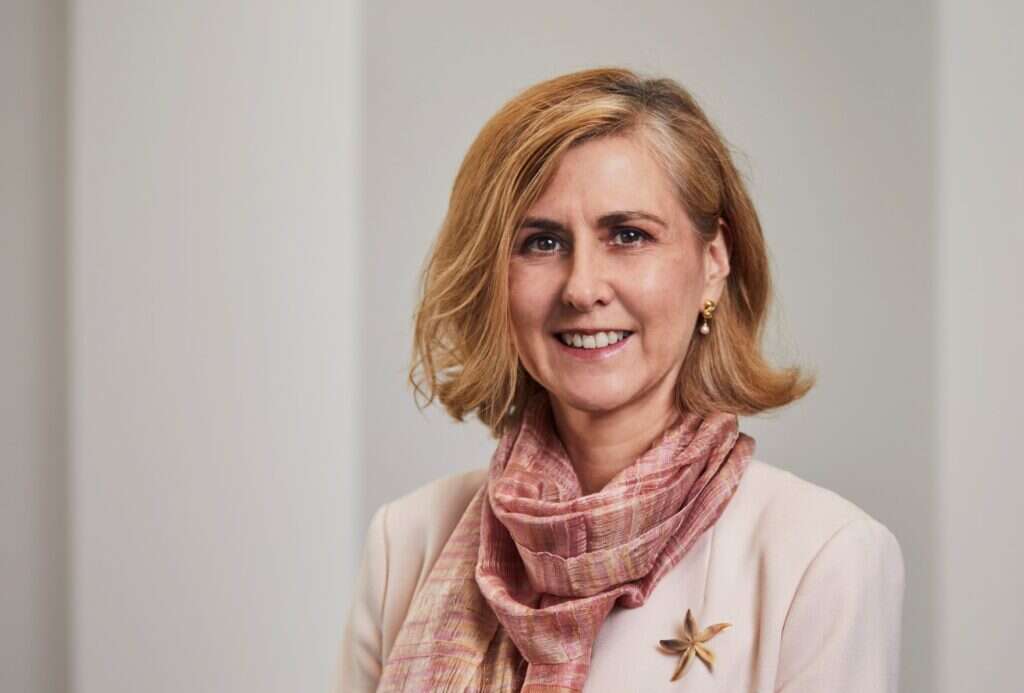
- The International Sustainability Standards Board (ISSB) is working to develop internationally relevant benchmarks for corporate reporting.
- ISSB vice chair Sue Lloyd says she is seeing huge interest and engagement, as is reflected by big corporate and investor spending on climate disclosure.
- While the ISSB will be largely focused on what investors need to know, enterprise value is not divorced from a company’s outward impact.
The world’s leading accounting standard-setter has had a busy six months – and is set to get busier, as momentum builds behind implementing appropriate sustainability disclosure frameworks and investors seek ever more transparency around ESG, particularly on corporate plans for emissions reduction and climate transition.
The International Financial Reporting Standards (IFRS) Foundation announced the launch of the International Sustainability Standards Board (ISSB) at the Cop26 climate summit in November last year. It came after a consultation that showed overwhelming support for the London-headquartered foundation to step into this space. The ISSB will have its board and chair’s office in Frankfurt but pursue a multi-location model.
Since Cop26 things have moved quickly, with peer organisation the Climate Disclosure Standards Board (CDSB) subsumed into the ISSB and recruitment for the rest of the team well under way.
ISSB chair Emmanuel Faber has a corporate background as the former chief executive of French food giant Danone. He has been a long-time advocate of providing non-financial information to investors; indeed, he was ousted from Danone for being too sustainability-focused.
Vice chair Sue Lloyd joined from sister organisation the International Accounting Standards Board (IASB) in March. Janine Guillot, chief of the Value Reporting Foundation – which will this year be consolidated into the ISSB also – is a special adviser.
The board should be fully in place during the third quarter of 2022, though there are already around 80 technical staff supporting the ISSB today, Lloyd tells Capital Monitor.
Most recently, the ISSB in late March proposed two standards, known as exposure drafts, for industry review: general requirements for disclosure of sustainability-related financial information, and for climate-related disclosures. The consultation will close on 29 July.
The plan is that by the end of this year the ISSB will have completed the technical work needed to establish the core elements of what it calls the global baseline for sustainability disclosure, which regional regulators and lawmakers can then build on.
This week, the organisation set out the steps it sees as necessary to reach that point, including international collaboration, particularly focused on emerging economies; establishing advisory and consultative bodies; and building on existing standards.
Long-awaited consolidation
While the ISSB’s standards will – much like the conventional IFRS accounting standards – officially be voluntary, it will be down to regional governments to decide how to implement them. While 140 countries today – notably excluding the US and China – use IFRS standards, the ISSB’s framework will be developed to be agnostic of conventional accounting standards, theoretically enabling their take-up worldwide.
The development of the ISSB has certainly come at a pivotal moment for ESG disclosure. After years of what is often dubbed a ‘wild west’, in which companies have no clear rules and hundreds of standards to choose from, risks are high and confusion is rife. Many data providers are heavily reliant on self-reported and unverified data from corporates or, worse still, proxies. The time has certainly come for consolidation.
Indeed the much-bemoaned ‘alphabet soup’ of standards and standard-setters is quite quickly evaporating. In June last year the International Integrated Reporting Council (IIRC) and Sustainability Accounting Standards Board (SASB) merged to become the VRF. Later that year, the CDSB became the foundation of the ISSB, and the VRF will soon go that way too.
Andy Agg, chief financial officer of London-listed National Grid, says the UK power utility is “excited” by consolidation of standard-setters. “Our investors are demanding more and more and giving them consistency is going to be critical. Though sometimes perfection is the enemy of pace, and we’ve got to make sure that isn’t the case here, we haven’t always seen that with the IFRS Foundation.”
Double materiality
The general understanding is that the ISSB will not incorporate what is called ‘double materiality’ – that is, it will focus largely on the impact of the changing climate on a company rather than on the impact of the company on the climate, as the assumption is this is what investors really care about. That said, its willingness to work with both European Financial Reporting Advisory Council (Efrag) and the Global Reporting Initiative (GRI), the oldest of standard setters, should give double materiality advocates some confidence.
The two are too difficult to separate, says Lloyd. “On the whole, companies with very high greenhouse gas emissions are likely to be subject to regulatory action and may see customers not wanting to buy their products in favour of greener options.
“We’re interested in impacts insofar as they affect enterprise value – and it’s often the case that when there is an impact [of the company on the environment] it does affect enterprise value,” she adds. “There is overlap.”
Some are hoping that the EU will reverse course and more closely align with the ISSB’s planned standards – but that seems unlikely to happen. There is only so far standardisation will go, it seems.
Striking the right balance
Standard setting is, of course, no easy feat, as there will always be detractors: those on one side saying the standards do not go far enough and others saying the burden on companies is too great. With that in mind, Lloyd says the team is ensuring it focuses on the information investors need to make capital allocation decisions, but without necessarily gathering all the information an investor might ask for.
“Some of the most important questions in the exposure drafts are how much all of this will cost and how long it will take, and whether it’s too much for smaller listed companies,” she says. “It’s about finding that sweet spot – we know we’re never going to make everybody happy.”
Certainly, companies are spending substantially in this area. On average each corporate spends $533,000 per year on climate-related disclosure, while institutional investors each put $1.3m annually into collecting, analysing and reporting climate data, according to a study published this month by the Sustainability Institute and carbon accounting firm Persefoni (see chart below).
“Most importantly, we want companies to understand why they’re providing the information because that will encourage them to approach it as a communication rather than a compliance exercise,” Lloyd says.
The ISSB is working with a range of experts and will ensure standards are drafted in a way that can be assured, should implementing regulators choose to mandate this, she adds. At the same time, says Lloyd, “we’re keen not to say that investors are all that matters – we’re interested in being part of the broader ecosystem and working with others to meet broader information needs too”
"Huge interest and engagement"
Lloyd concludes: “My main takeaway so far is the huge amount of interest and engagement we’ve had from the industry. There’s a real sense of momentum, and that’s fantastic because at the end of the day what we do benefits from the quality of the input we get. We’re trying to make the most of that enthusiasm.”
That view was supported by Hywel Ball, UK chair of ‘big four’ accounting firm EY, at this month's Net Zero Delivery Summit in London. “With all the clients we engage with, boards are engaged in a way they’ve not been [before],” he said. “They tell us investor meetings have gone from no questions [on climate disclosure] to 80% of these meetings being taken up by investor questions.” Along with cybersecurity, Ball added, non-financial reporting is the biggest reputational risk companies fret about.
“People are very worried about the loss of trust [caused by greenwashing], and everyone is trying to do better,” he added. “If we lose that trust it’ll be very difficult to get it back – we’ll have a very cynical audience out there in society.”




